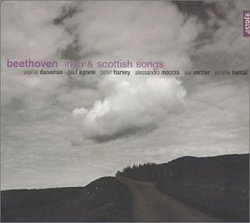| All Artists: Beethoven, Daneman, Agnew, Hantai Title: Irish & Scottish Songs Members Wishing: 0 Total Copies: 0 Label: Astree Original Release Date: 1/1/2002 Re-Release Date: 1/8/2002 Genre: Classical Styles: Opera & Classical Vocal, Historical Periods, Classical (c.1770-1830) Number of Discs: 1 SwapaCD Credits: 1 UPCs: 709861088508, 329849088506 |
Search - Beethoven, Daneman, Agnew :: Irish & Scottish Songs
 | Beethoven, Daneman, Agnew Irish & Scottish Songs Genre: Classical
|
Larger Image |
CD Details |
CD ReviewsBeethoven & Pop Song: You say you want a revolution? o dubhthaigh | north rustico, pei, canada | 04/14/2002 (5 out of 5 stars) "It's a good job Beethoven's dead. Almost every songwriter out there these days would be out of work, and if he could break dance, well, .... To get to the point, for a bit of work that is generally regarded as less than major in his canon, Beethoven ably demonstrates he has the chops to blow the doors off every and any writer of popular tunes. Commissioned to write settings for some popular Irish and Scottish songs, B set to reworking and rethinking and recasting them entirely, and the results, while certainly not imperative repertoire for the classically minded, nonetheless are incredibly great songs. I've known these tunes all my life, and it was as though I heard them for the first time. Apparently, they had the same effect 300 years ago. The singers and the musicians on this disc excel in conveying the groundbreaking settings and dynamics written into the tunes, and you'd have a very clear impression that this was very much a living dynamic and not a scholastic interpretation. "On the Massacre at Glencoe," Beethoven brings in the profound horror and sorrow, as tangent now as though it were 9-11. As an Irishman, I have no particular fondness for "God Save the King," but what a reworking! Worthy certainly of King Crimson, this is a striking resetting of something that is regarded as pompous wallpaper now. "The Vale of Clywyd" and "The Return to Ulster" turn well worn folk tunes to a new light and reveal a sense of passion about homeland that is gripping. This CD serves fair warning to Elvis Costello, Joe Jackson, Billy Joel, and even McCartney to hone their craft if they wish to make the journey from pop to classical, because in the hands of a master, making the journey from Classical to Pop can be a striking, revelatory and glorious expedition. Beethoven and his colleagues on this CD succeed in upending preconceptions about the power of popular song as few artists ever have. Serious classical music? Kind of - Beethoven fully intended to knacker all expectations. Serious great songs? Indeed! Well worth the purchase! God Save Ludwig, the likes of ye we'll ne'er see again." A decent classical album, but a terrible folk album Bradford Daniels | Redmond, WA | 05/10/2002 (4 out of 5 stars) "I am not a classical music aficionado, nor a great Beethoven fan, but I bought this CD because it promised to show that at least one great classical composer understood what folk music was all about. I had unrealistic visions of sprightly tunes enhanced by symphonic arrangements and complex harmonies designed by a recognized master.I probably should have known better, but I recently bought "Alfabeto" (ASIN B00005R2JE), which showed that classical music can have rhythm and varied sound, so I had my hopes up. Of course, "Alfabeto" came from that magical period of experimentation in the late renaissance before the new classical strictures came to exercise their centuries-long stranglehold on European music. Beethoven, sadly, was himself one of the chief stranglers.In listening to this CD, I was forcibly reminded of the things that have always kept me from becoming a wholehearted fan of the classical idiom. Irish, Welsh, and Scottish music are known not only for their lively melodies, but also for their powerful, danceable rhythms and a difficult-to-quantify accessibility that is the birthright of all folk music.Beethoven, like most if not all of the classical composers of his era, managed to retain the traditional tunes while replacing the rhythm and accessibility with ostentation and complexity. In Beethoven's hands, the Irish fiddle becomes a violin, the tin whistle becomes a stately flute, and the bodhran vanishes from the scene entirely. Add an operatic voice for the lyrics in place of a traditional folk-singer's voice, and what's left bears less resemblance to the traditional music of Great Britain than Haydn's gypsy dances bear to the actual music of the Romany people.A few of the tracks (notably "On the massacre of Glencoe" and "What Shall I Do") had a mournful quality in the original that translated well to Beethoven's style. As for the rest, though...Listening to this CD reminded me of the first time I drank Cristal. I could not help but mourn how the sweet juice of the succulent grapes I had loved as a child could be subjected to so much refinement for refinement's sake that nothing remained but a dry, astringent bottle of acidic disappointment. Of course, you may be someone who likes Cristal, in which case, this recording may be just your style. As for me, though, I'll take my grapes fresh, or perhaps in a nice drinkable white zinfandel, and I'll keep my folk music similarly unrefined." Superb Performance of Folk Music Apotheosized R. Zartman | 08/29/2008 (5 out of 5 stars) "Beethoven had a light enough touch to take folk music and make them into great music."
|

 Track Listings (24) - Disc #1
Track Listings (24) - Disc #1